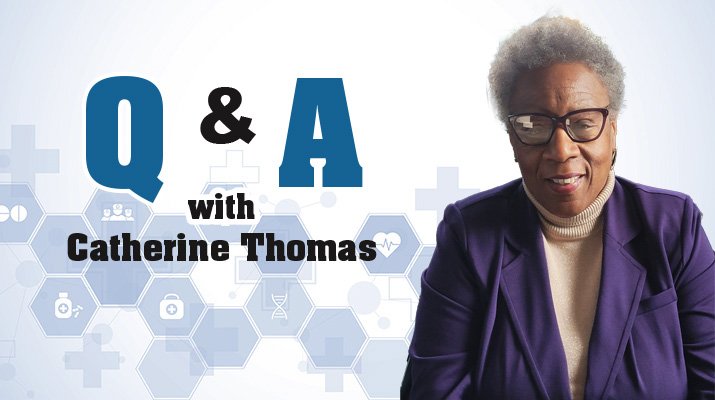Baden Street Settlement’s new executive director spent 35 years in human services before taking over the nonprofit in October. She discusses the agency’s work, which touches the lives of thousands of children, teenagers and adults
By Mike Costanza
Since it was founded in 1901, the Baden Street Settlement has grown into a community asset that touches the lives of thousands of children, teenagers and adults each year. Families in need turn to Baden Street for help with their rents or mortgages; children enjoy the nonprofit’s after-school programs and seniors come together to share free meals or just socialize. Baden Street also has behavioral and substance abuse counseling programs, respite care services, a day care center, a food pantry and a number of other services.
The Rochester nonprofit occupies six buildings altogether, including its Baden Street headquarters. It has 110 full- and part-time employees on its payroll and a budget of $5.5 million.
Catherine Thomas, Baden Street’s new executive director, spent 35 years in human services before she took over the nonprofit on Oct. 9, including a stint as the director of the Monroe County Children’s Center.
She spoke to In Good Health about her organization, its challenges and the ways it approaches them.
Q: What is Baden Street’s overall purpose as an organization?
A: Baden Street’s overall purpose is to provide services to the community based on community needs from a wholistic approach, “wholistic” meaning all aspects of [the] family. All of our programs are designed based upon meeting the needs at-large of the community. They all feed off each other to create the collective impact for the community at large. They’re all interconnected to reduce the level of social problems associated with being poor and disadvantaged.
Q: Can you give an example of how that interconnectedness might benefit the community?
A: An infant, a 5-year-old, a 15-year-old, an adult, all aspects of that age range is able to participate at some level of program within the scope of what we offer at Baden. Seniors as well. If have my grandmother or my mother living with me, we have a senior program that provides services and a place to come and socialize. They play games together, they network, they communicate, they get lunch. It’s a great place to address loneliness in aging.
Q: Three of Baden Street’s programs offer services to youth and children, including the Metro Council for Teen Potential (MCTP). Is that an important focus for your nonprofit?
A: Yes. When that program, MCTP, was created, there was a huge population of teens becoming pregnant. As teens become pregnant, that feeds into poverty, violence, some of the other ills that happen in the community. That program provides education and support for our young teens. You teach prevention. It’s prevention, intervention and education.
Q: The frequency of violent crimes, including shootings and car thefts, increased greatly among Rochester teenagers this year. How is Baden Street approaching that problem?
A: Baden Street has been very intentional about providing opportunities for these young people. As we know, research says that it’s between the 3 and 5 [p.m.] hours when kids are unsupervised. That’s when you see a spike in crimes in youth. What Baden Street does is offer after-school programs to fill that time. We provide after-school programming until 7:30 in the evening to provide support for families and youth. They have access to games. They have access to the digital area — computers. They have access to a place where they can just come and get support. Sometimes our families just need somebody to talk to, just somebody to listen to them. There are also different kinds of activities that take place every other weekend.
Q: What other steps might Baden Street take to attack the problem of youth violence?
A: That has been an ongoing conversation. Just prior to starting here, I was involved with a number of initiatives, working with Monroe County, Pathways to Peace, Rise up Rochester, SNUG (Should Not Use Guns), the Community Resource Collaborative and other community organizations. We all have the same interest in trying to address the level of violence in the community with our young people and the behavior around stealing the cars and so forth. It’s a community pandemic, if you will. We are all concerned, and working collectively on what we can do.
Q: Has that group of nonprofits come up with a way to attack the problem?
A: There are a number of community issues to address specifically around that population of our young people that are getting involved in those types of crimes. We’re collectively working on an initiative to try to eradicate that behavior. We’re looking at different models, and there has not been a model that we have agreed on and settled on at this point. Is it mentoring? We’re looking at increasing mentoring opportunities. Is it more jobs? Not summer of opportunity jobs but year-round jobs?
Q: What challenges does Baden Street face as an organization right now?
A: The open drug market is a challenge that leads to poverty and violence. 14605, this Zip code, has the highest level of poverty within Monroe County. By providing adequate housing, job opportunities and rebuilding a sense of community through education and support of the families that live in this community, hopefully that would accomplish some level of stability. When the community begins to feel a sense of stability and ownership that would impact the level of violence.
Another challenge that we are seeing right now is the infrastructure. The infrastructure, the physical plant of two buildings, is ancient. We’re working on kicking off a capital campaign to reconstruct some of our older buildings; one being to totally demolish and reconstruct the Baden Street administration building. We also, in that capital campaign, would be renovating the Vienna Street building. We’re looking at trying to raise about $10 million for the whole campaign.

